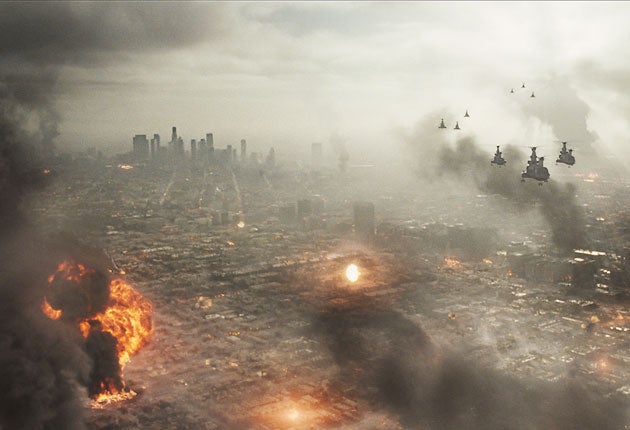Disaster movies are pulled from Japanese screens after tsunami

Your support helps us to tell the story
From reproductive rights to climate change to Big Tech, The Independent is on the ground when the story is developing. Whether it's investigating the financials of Elon Musk's pro-Trump PAC or producing our latest documentary, 'The A Word', which shines a light on the American women fighting for reproductive rights, we know how important it is to parse out the facts from the messaging.
At such a critical moment in US history, we need reporters on the ground. Your donation allows us to keep sending journalists to speak to both sides of the story.
The Independent is trusted by Americans across the entire political spectrum. And unlike many other quality news outlets, we choose not to lock Americans out of our reporting and analysis with paywalls. We believe quality journalism should be available to everyone, paid for by those who can afford it.
Your support makes all the difference.A woman in a luxury hotel at an Asian beach resort goes for a wander - it's an idyllic and beautiful setting but there is something ominous in the air. Suddenly, before she or the street vendors can get away to safety, a huge tsunami comes rolling towards them, sweeping up everything in its path.
Thus begins Clint Eastwood's recent film Hereafter. It is a spectacular and grim overture which inevitably has become very uncomfortable to watch for some audiences in the wake of last month's disasters.
Following the earthquake and tsunami in Japan, Hollywood studios have postponed the releases of several films featuring images of mass destruction, flooding or entrapment.
Hereafter (which had already been released) was quickly pulled from Japanese cinemas with Warner Bros conceding that certain scenes "were not appropriate".
Another movie held back was Sony's Battle: Los Angeles. In The New Yorker's words, this is "a quiet, uneventful chamber piece... in which almost nothing happens except that a humongous army of homicidal aliens splashes down off the coast of California, marches ashore, annihilates every human in sight, and sets about sucking up water from the face of the earth".
Japanese audiences will also have to wait to see Universal's Australian-made 3D adventure drama Sanctum, with James Cameron as executive producer, in which an underwater cave diving team end up stranded after a freak tropical storm.
It's easy to see why such films have been delayed or taken out of theatres.
Showing them now would be tasteless, insensitive - and a very bad idea from the point of view of potential box-office.
The film industry's focus has been more on revenue than on the sufferings of the Japanese people, as encapsulated in the reporting of trade paper The Hollywood Reporter last month in the immediate aftermath of the tsunami: "The good news is that theatrical exhibition continued in more or less reasonable fashion in those parts of Japan not affected by the earthquake."
One irony about the decision to shelve these films is that Japanese audiences have always savoured disaster movies.
Whether it's manga adaptations such as Akira(which starts with Tokyo being destroyed by a nuclear explosion), or Godzilla monster movies, or bloodcurdling yakuza movies, an apocalyptic undertow can be felt in almost every Japanese genre.
There is something paradoxical about Hollywood's attitude toward disaster movies. Such films are made because of audiences' desire to stare into the abyss. There's clearly a demand for them. Even so, the studios remain sensitive about offending audiences.
The disaster movie has moved relentlessly upmarket over the past 50 or 60 years, leaving the B-movie behind.
"I destroyed Washington, I destroyed the Golden Gate Bridge, I destroyed New York," special effects maestro Ray Harryhausen used to boast of the monsters he unleashed in B-movies like The Beast From 20,000 Fathoms and It Came From Beneath the Sea.
Now, disaster movies seem very realistic - which makes them all the harder to dismiss as fantasy.
Join our commenting forum
Join thought-provoking conversations, follow other Independent readers and see their replies
Comments